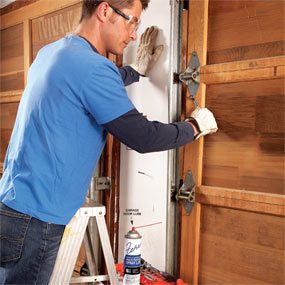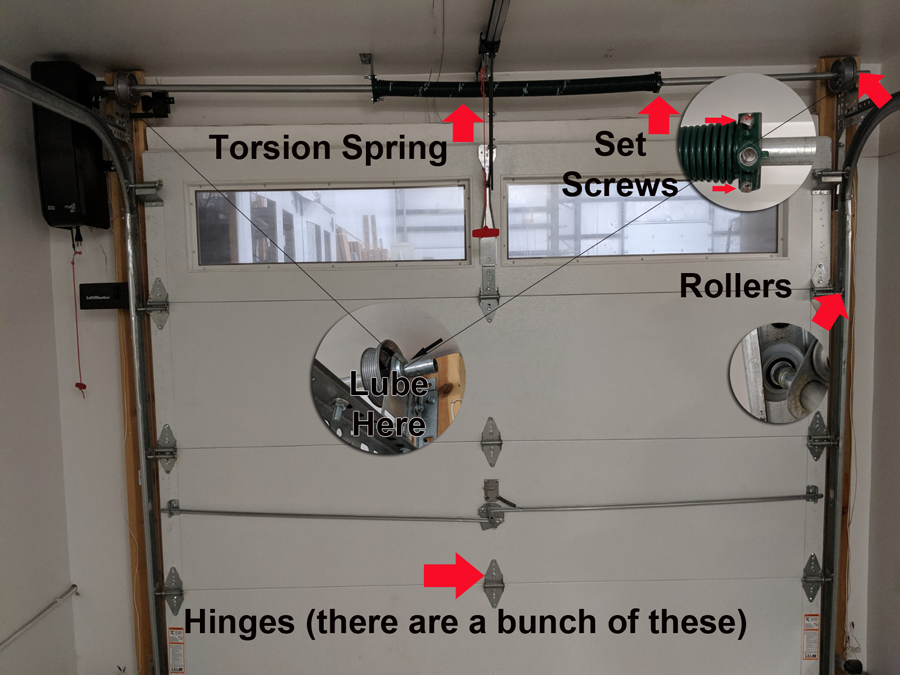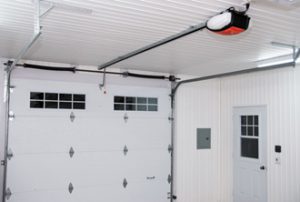Table of ContentsHow To Fix A Noisy Garage Door With Garage Door LubeHow To Fix A Noisy Garage Door?How To Quiet Down A Loud Garage Door OpenerHow To Reduce Garage Door Noise
Sometimes, the sound you're hearing from your garage door is straight related to the opener. If your garage door opener all of a sudden seems louder than normal, it could be an indication that it's wearing and coming to the end of its time. However, before you make the choice to get a new garage door opener, there are a couple of things you can inspect that'll restore your current opener.
This is a common upkeep job related to chain driven openers. Another cause of a noisy garage door obtaining from the opener is that the inner-workings are worn out. Take an appearance at your opener's handbook and make changes from there. If you're uncomfortable doing so, contact your regional repair work service.
As this is the most drastic step to consider a noisy garage door, you should check whatever to make sure you didn't miss the reason for the noise. Oftentimes, an old and broken garage door will be loud no matter what. For instance, a dented aluminum one or a rotting wood garage door are both lost causes.
Unlike wood and aluminum, a steel garage door will stand the test of time and will not rot, swell, warp or dent. They're produced the Midwest. Just the garage door isn't adequate though. You need to match that door with a quality opener and exceptional installation. If your garage door is not appropriately set up, it'll start making noise in no time.
We've been serving the Midwest for over 40 years and have all the skills and experience needed to get the job done right. Our installers are factory qualified and licensed in order to ensure that your garage door gets set up correctly and effectively. So, if you can't find the source of your noisy garage door and have exhausted all other options, get a complimentary quote now for a new garage door from Feldco that'll remain peaceful and keep you and the next-door neighbors pleased.
My Garage Door Opener Is Making A Lot Of Noise

It can be bothersome to have a garage door that rattles, squeaks, and screams as it opens and closes. Some property owners declare they can hear and feel their garage door opening in every room in the house. It can be a good warning signal, however ultimately it's the additional sound that you might do without.
Garage doors develop vibrations throughout opening and closing. This leads to loud and distracting sounds. It might not be an issue during the day, however if you are attempting to sleep, it can be disruptive. Minimize the vibrations, and you will lower the sound level. You do not need to change your garage door or door opener with a quieter model, just do a little upkeep.
Ensure whatever is tight. Be cautious not to over-tighten. Garage doors have moving parts that require to be maintained. Spray the top of the springs with lubricants, utilizing enough oil or lubricant to flow down to the base of the springs. Spray the within each track and around all the metal rollers.
View and figure out if the chain is sliding easily around the equipments. Spray the hinges between all the panels. Any moving part can cause vibrations. Keep garage noise to a minimum by lubing moving parts a minimum of two times a year. Be liberal when utilizing spray lubes. Examine the rollers on your garage door.
 How Much Do Garage Doors Cost To Replace?
How Much Do Garage Doors Cost To Replace?
Nylon rollers are much quieter, do not require lubes, and need less upkeep than metal rollers. Nylon garage rollers aren't much more expensive, and the noise reduction deserves the additional money. Requirement five-section garage doors require a dozen rollers. If you are replacing your rollers, do them at one time.
Noisy Garage Door, Easy Diy Fixes
Pieces of rubber utilized as buffers for the garage door and the door openers will help you decrease sound. Before dealing with your door and opener, unplug the motor of the door opener. Place a strong ladder under the door and rest the door on the ladder. Eliminate the door opener motor from its mounting bracket and place it carefully on the flooring or your workbench.
Slide a piece of rubber about 1/4 inch wide in between the door and the bolts. Tighten up the bolts. Next, remove the bolts holding the door to the assistance frame. Using thick rubber, cut 2 rectangle-shaped pieces, drill two holes, and bolt one end to the frame of the garage door opener.
Suspend the opener from the frame by the rubber pieces. The rubber will soak up noisy vibrations prior to they cause https://www.johnsgaragedoorrepair.com/garage-spring-repair-tucson/ the metal support frame to shiver. Test the garage door and opener to ensure that they still work properly. You may have to adjust your garage door locks after working on the bolts and gaskets.
 How To Tell If You Should Fix Or Replace A Garage Door
How To Tell If You Should Fix Or Replace A Garage Door
Watch for the lock bar striking the track, making sounds and not capturing. When your door moves up and down, misalignments can cause grinding noises. Find the L-shaped leader brackets connected to the door. Reverse the screws and tap the guide up or down; depending upon how the alignment is off, tighten the bolts and screws and repeat on the other guide.
With a missing insulation strip, you will feel cold and damp entering into your garage and hear a loud banging noise when the door is closed. You can quickly replace this strip by eliminating the old one and buying a roll of rubber insulation from your local lumber or garage door shop.
How To Muffle A Noisy Garage-door Opener
Slide-out the old and worn strip and move the new rubber through the tracks in the door. Enjoy as you godon't get ahead of yourself and cut the insulating strip too short. If the strip is too long, that's all right; you can adjust it later. Rubber insulation will shrink, so don't cut it to fit your door width precisely.